4 Things You Should Know about Big George Foreman
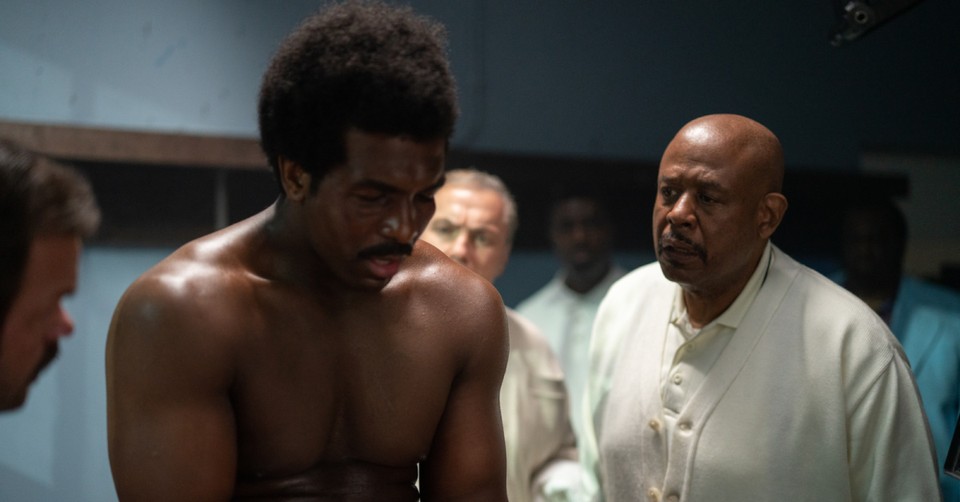
George is a middle-aged, washed-up boxer with a passion for Jesus and a desire to help teens stay out of trouble.
He used the millions of dollars he made in the ring to launch a multi-purpose youth center. It includes a basketball court. It includes a weight room and a boxing ring. Unfortunately, though, it doesn't include lights.
That's because George is broke, and the man who manages his money didn't pay the utilities.
But George has a plan. He'll lose weight. He'll get back in the ring. And he'll make enough money to keep his youth center open.
Will it work?
The new biopic film Big George Foreman (PG-13) tells the true story of two-time heavyweight champion George Foreman, who overcame multiple obstacles throughout his life in order to become one of boxing's greatest fighters. He also became a preacher.
Here are four things you should know:
Photo courtesy: ©Sony, used with permission.
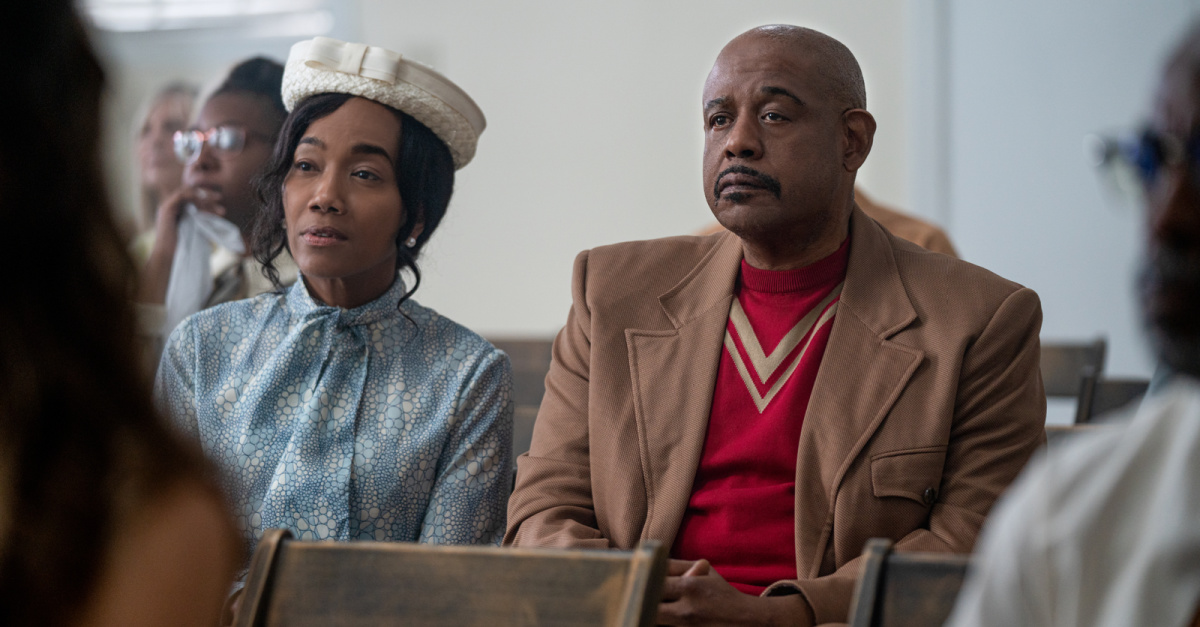
1. It's a Comeback Story Like No Other
Comeback stories are common in the inspirational film genre. Big George Foreman, though, follows a double comeback.
In the first half of the film, Foreman overcomes poverty and an out-of-control temper to win his first heavyweight title. We watch as his loving mother breaks a single sandwich into five parts to feed her family. (She prays over it, thanking God for His loving care.) We watch as Foreman punches a classmate for calling him "poor man." We then watch as Foreman, now a young adult, threatens to kill a man who stole his shoes. It is that latter fit of rage that sparks a mentor, Charles "Doc" Broadus, to guide Foreman into the boxing ring, where he wins the heavyweight title in 1973 before leaving boxing in 1977.
In the second half of the film, Foreman overcomes bankruptcy in the 1980s by re-launching his boxing career in order to fund his youth ministry. ("There's only two things I know how to do. That's box and preach. Preaching won't pay the bills," he says in the film.) His launch of the George Foreman Grill – which brought in millions of dollars – also is briefly referenced.
"The first time he was fighting for a comeback for the wrong reasons," director George Tillman Jr. (The Hate U Give) told Crosswalk, referencing Foreman's initial drive for fame and fortune.
"The second time he came back just because he lost all his money and he wanted to save his youth center that he had built."
Tillman added, "George was never meant to go this far. And he did it twice."
Photo courtesy: ©Sony, used with permission.
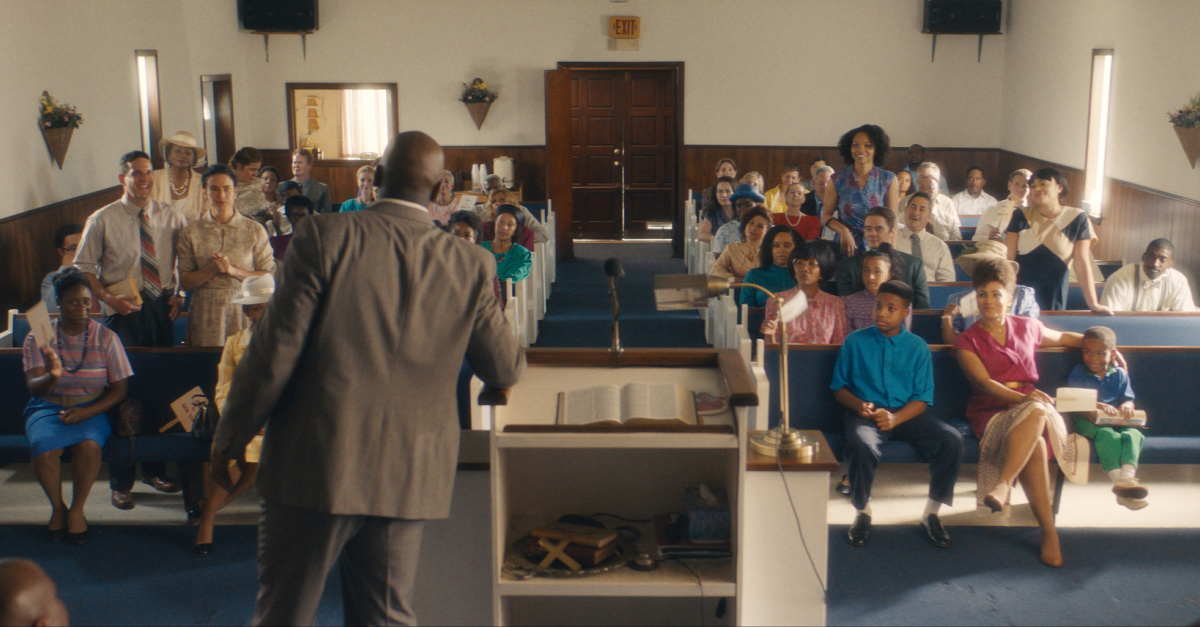
2. It's Filled with Faith and Hope
Big George Foreman has lots of crossover appeal but has plenty of faith-centric content, too. (It's being marketed to churches.) We see Foreman's mom pray and, later, encourage him to get back in church. We see a baptism. We see plenty of scenes within the church.
Of course, the plot – like the real-life story – takes a turn when Foreman experiences a "Road to Damascus"-like moment that he later described as a near-death experience.
"He said he died," Tillman told Crosswalk.
The film shows Foreman fuming in the dressing room following a 1977 upset loss to boxer Jimmy Young. Foreman then falls to the floor as his trainer, and his crew rush to his side. We hear his heart stop. Moments later, he comes back to life, stands to his feet and runs around the room, shouting praises to Jesus.
Prior to that moment, Foreman was filled with pride and a lust for money. After it, he was driven by selflessness and altruism.
"From there, he was a Believer," Tillman said.
Foreman told Crosswalk, "A hand reached in and pulled me out of nothing and death. … I started screaming, 'Jesus Christ has come alive in me.'"
He walked away from boxing and even walked away from a rematch with Muhammad Ali that would have earned him millions of dollars, win or lose. (Foreman took in $5 million in their first fight, the so-called Rumble in the Jungle.) Instead of boxing, he turned to preaching and ministry. He founded a youth center.
"For a long time, [Ali] thought it was a joke like everyone else," Foresman told Crosswalk, referencing his ministry.
The film showcases the power of the gospel but includes other lessons, too. It reminds us to keep our lives "free from the love of money" (Hebrews 13:5). It urges us to place the needs of others before our own. It encourages us to forgive. (Foreman does that several times). It also underscores the importance of a godly family. Foreman may not have walked the narrow path early in life, but he returned to his mom's values later in life.
It's a feel-good film packed with hope.
Photo courtesy: ©Sony, used with permission.
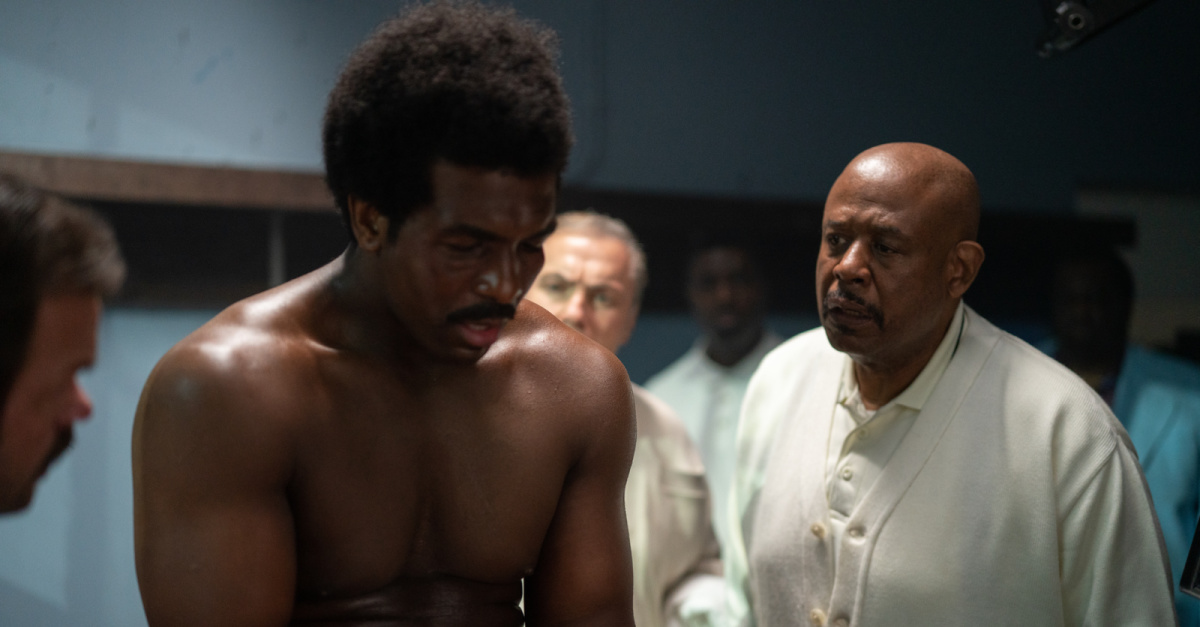
3. The Lead Actor Gained 50 Pounds
The 6-foot-4 Foreman weighed 217 pounds when he won his first title in 1973. For his heavyweight title fight against Michael Moorer in 1994, he weighed 250. Of course, that latter 250-pound weigh-in came only after Foreman lost weight.
"When I made up my mind that I was gonna make a comeback, I was 315 pounds," Foreman told Crosswalk.
Tillman, the director, had two options for his lead actor, Khris Davis: 1) Employ special effects to make him look bigger, or 2) Ask him to gain weight for the role. He chose the latter. Tillman got the idea from one of his heroes, Robert De Niro, who gained 60 pounds for Raging Bull (1980).
"I did Men or Honor with him. I remember asking him, 'How did you pick up the weight in Raging Bull?' He's like, 'I just went to Italy. And I just ate.'"
For Big George Foreman, the "early life" scenes were shot first. Then the cast and crew took a six-week break to allow Davis to gain weight. He gained 50 pounds.
"He was able to play the younger George and the older George," Tillman said.
The director said of the transformation: "I couldn't believe I was looking at the new George Foreman – the bald head, the big stomach. He wasn't the same guy."
Photo courtesy: ©Sony, used with permission.
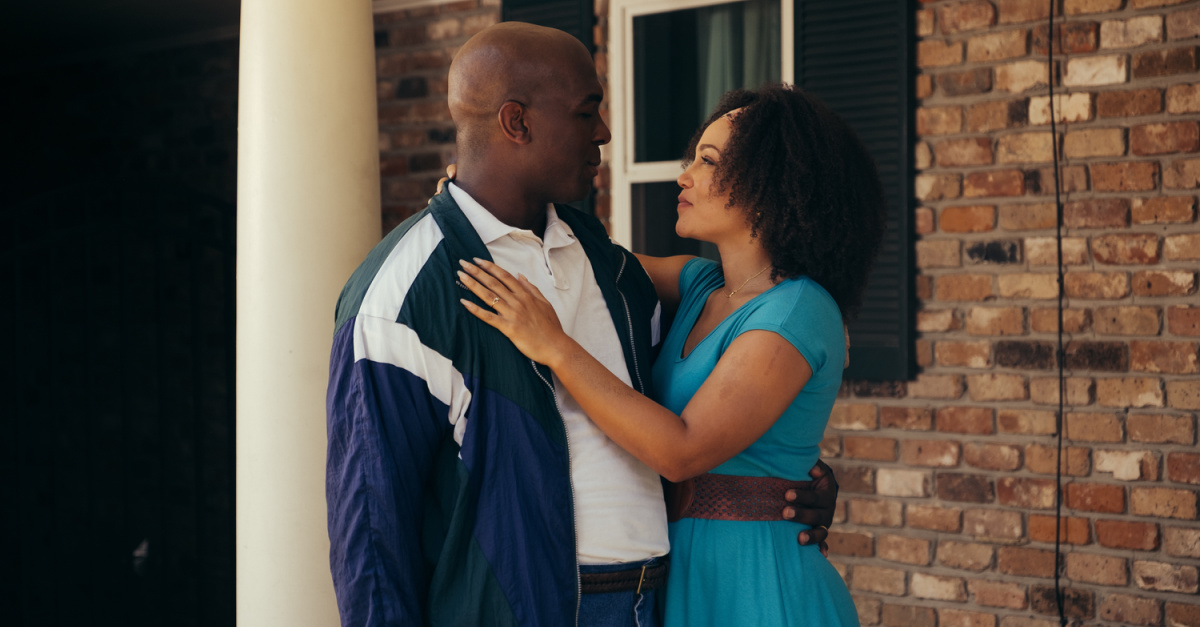
4. It's One of the Best Sports Movies Ever Made
Big George Foreman takes you on an emotional journey – from the days he was bullied on an elementary school playground, to his shocking rise to fame as an Olympic Gold medalist and heavyweight champion, to his days in retirement when he lost all his money, and then to his second rise to stardom as two-time heavyweight champ.
It's a feel-good rollercoaster that's worth riding again and again. It's also one of the best sports movies you'll ever watch.
For fans of nostalgia, there's plenty to like. Jones is marvelous as a trash-talking Muhammad Ali. Matthew Glave is believable as Howard Cosell ("Down goes Frazier!"). The film carries us across four decades, from the 60s to the 90s, mirroring the look and feel of each era. Whitaker is solid as Foreman's mentor. Davis fits the role perfectly.
Boxing forms the backdrop to the bigger story of faith.
"The most important thing I'd like for the people who go to the movie to take out is that there is hope," Foreman told Crosswalk. "And there's a reason for our faith – there's a living God. And I'm proof of it. That's all – forget about the boxing and the winning and the losing and all of that. Faith in God is what that movie is about."
Rated PG-13 for some sports violence. The film contains no coarse language or sexuality/nudity. It depicts Foreman as unfaithful to his marriage early in life. In one scene, we see a woman who is not his wife appear in his hotel room (She's clothed but dressed seductively.) She then sits on his lap and asks him to show her his "moves" before the scene cuts away. The boxing action, though violent, is not as violent as the Creed films or the Rocky films.
Entertainment rating: 5 out of 5 stars.
Family-friendly rating: 4 out of 5 stars.
Photo courtesy: ©Sony, used with permission.
Michael Foust has covered the intersection of faith and news for 20 years. His stories have appeared in Baptist Press, Christianity Today, The Christian Post, the Leaf-Chronicle, the Toronto Star and the Knoxville News-Sentinel.
Listen to Michael's Podcast! He is the host of Crosswalk Talk, a podcast where he talks with Christian movie stars, musicians, directors, and more. Hear how famous Christian figures keep their faith a priority in Hollywood and discover the best Christian movies, books, television, and other entertainment. You can find Crosswalk Talk on LifeAudio.com, or subscribe on Apple or Spotify so you never miss an interview that will be sure to encourage your faith.
Originally published April 27, 2023.





